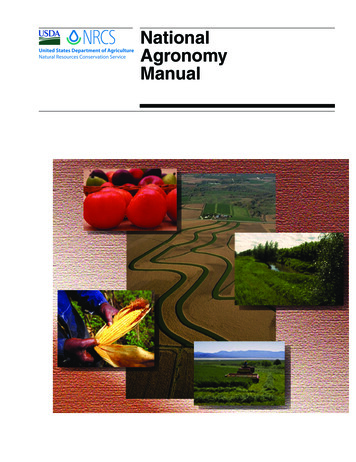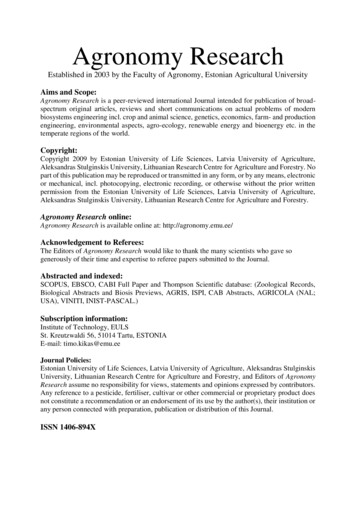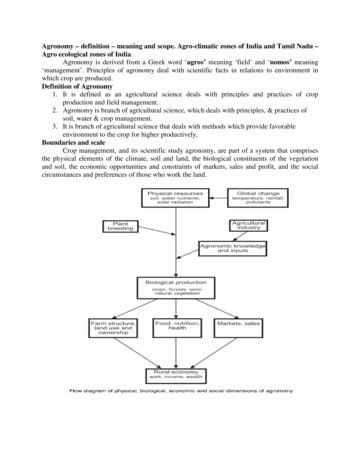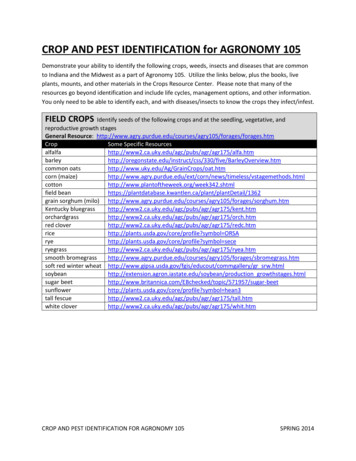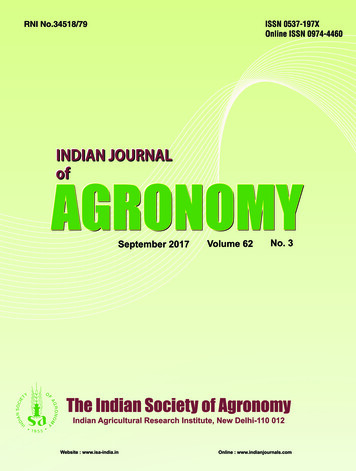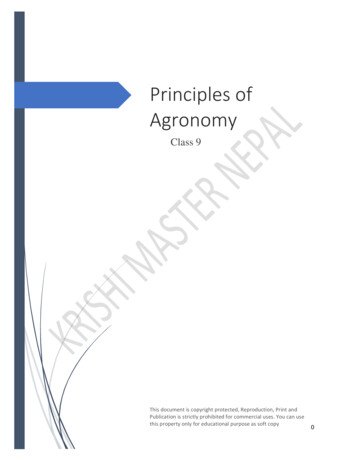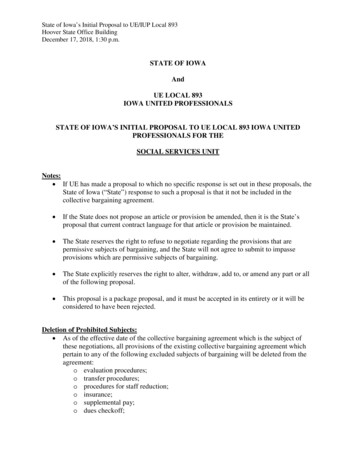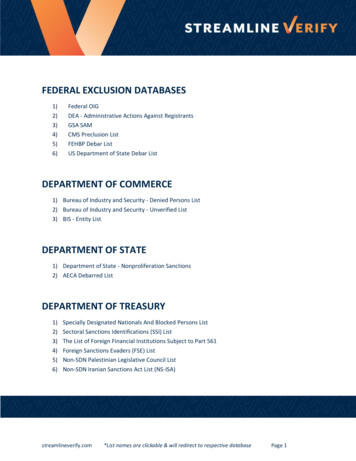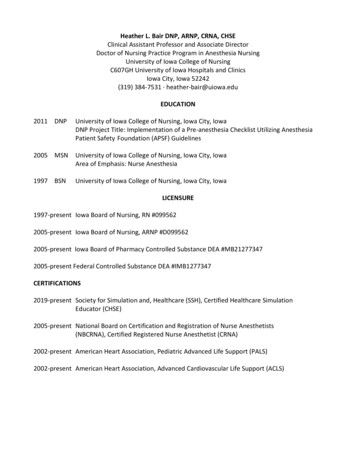
Transcription
AgronomyAGRONOMYU.S. Diversity: 3 cr.Undergraduate Studystudents/div-ip-guide/usdiversity-courses (https://Agronomy is the science and technology of producing plants that servehumans, using practices essential for maintaining and improving life. TheDepartment of Agronomy offers a major leading to a degree of bachelorof science (BS) in agronomy. Graduates have the theoretical and practicalknowledge needed for efficient and sustainable crop production. Theyare skilled in critical thinking, problem solving, communicating, andworking effectively with others. They understand the ethical, cultural, andenvironmental dimensions of issues facing agronomists globally.3 cr. from approved U.S. Diversity list: /)Communication/Library: 13 cr.6 cr. of English composition with a C or better and 3 cr. of speechfundamentals with a C or better.ENGL 150Critical Thinking and Communication3ENGL 250Written, Oral, Visual, and Electronic Composition3SP CM 212Fundamentals of Public Speaking3or AGEDS 311 Presentation and Sales Strategies for AgriculturalAn agronomy major prepares students for employment in crop productionand soil management, yield forecasting, precision farming, plantbreeding, agricultural business and industry, agricultural serviceorganizations, environmental and natural resource management, and1AudiencesLIB 160Information Literacy1One of the following:ENGL 302Business Communication3ENGL 309Proposal and Report Writing3management specialists, research technicians, sales and marketingENGL 314Technical Communication3specialists, and production managers. State and federal agenciesHumanities: 3 cr.farm management. Graduates pursue careers in the seed, fertilizer,and agricultural chemical industries as field agronomists, crop and soilemploy agronomists as extension specialists, county extension directors,3 cr. from approved humanities list: http://www.cals.iastate.edu/student-environmental and natural resource specialists, research associates,services/humanities (http://www.cals.iastate.edu/student-services/soil surveyors, soil conservationists, grain inspectors, integrated pesthumanities/)managers, land appraisers, agricultural lenders, and other science-basedprofessionals.Social Sciences: 3 cr.3 cr. from approved social sciences list: http://www.cals.iastate.edu/An agronomy major also prepares students for graduate school. Westudent-services/social-sciences (http://www.cals.iastate.edu/student-offer a concurrent BS/MBA degree. About a quarter of our studentsservices/social-sciences/)immediately continue into research-based MS and PhD programs. As anundergraduate, there are many opportunities to be involved in research.Ethics: 3 cr.3 cr. from approved ethics list: http://www.cals.iastate.edu/student-Department of Agronomy website - http://www.agron.iastate.edu/.services/ethics cs/)(http://www.agron.iastate.edu/)Mathematical Sciences: 6 cr.Curriculum in AgronomyMATH 140College Algebra3STAT 104Introduction to Statistics3Only 65 cr. from a two-year institution may apply which may include upPhysical Sciences: 8 cr.to 16 technical cr.; 9 P-NP cr. of free electives; 2.00 minimum GPA. ACHEM 163College Chemistryminimum of 15 credits of agronomy courses must be earned at Iowa& 163Land Laboratory in College ChemistryState and not transferred from other institutions.One of the following:International Perspective: 3 cr.AGRON 259Organic Compounds in Plants and Soils33 cr. from approved International Perspective list: http://BBMB 221Structure and Reactions in Biochemical p-guide/IntlPerspectives-currentCHEM 231Elementary Organic ts/div-ip-guide/IntlPerspectives-& 231Land Laboratory in Elementary Organic ChemistryTotal Degree Requirement: 128 cr.current/)5Life and Biological Sciences: 7 cr.BIOL 212Principles of Biology II& 212Land Principles of Biology Laboratory II4
2AgronomyAGRON 320or BIOL 313Genetics, Agriculture and Biotechnology3Principles of GeneticsAGRON 360Environmental Soil Science3or AGRON 392 Systems Analysis in Crop and Soil ManagementAGRON 410Supporting Sciences: 15 cr.Professional Development in Agronomy: Senior1ForumCourses cannot be used to fulfill any other agronomy requirements. Atleast 9 cr. must be in courses numbered 300 or above.Additional AGRON credits at the 300-400 levelThis requirement can be met in one of three ways:Electives: 18 cr.Additional free electives618a. Complete at least 3 credits in basic or mathematics-intensivediscipline (ACCT, BBMB, BIOL, CHEM, COM S, ECON, All Engineering,GEOL, GEN, MATH, MTEOR, PHYS, STAT) as well as at least 6Agronomy, B.S.Freshmanadditional credits in BIOL, BBMB, ENSCI, ENT, GEOL, HORT, GEN,MICRO, NREM, PL P, TSM. The other 6 credits can be a combinationof the above department's courses and/or AGRON.b. Complete the courses needed to fulfill a second major thatcomplements the student's academic and professional goals.FallCreditsSpringCreditsAGRON 1101 AGRON 1813AGRON 1803 AGRON 1823AGRON 1831 BIOL 2123CHEM 163 & Lab or CHEM5 BIOL 212L1c. By the end of the third semester before graduation, petition the177 & LabAgronomy Curriculum Committee with a specific set of coursesENGL 1503 ENGL 2503LIB 1601 Math or Social Sciences3Math or Social Sciences3designed around "keeper of the land," "builder of genetic diversity,""explorer of plant life," "developer of bio-energy," "confronter of worldhunger," or "designer of sustainable systems."17Agronomy Core: 46 cr.AGRON 105Leadership ExperienceRAGRON 110Professional Development in Agronomy:1OrientationAGRON 180Global Agriculture in a Changing World3AGRON 181Introduction to Crop Science3AGRON 182Introduction to Soil Science3AGRON 183Basic Skills for Agronomists1AGRON 206Introduction to Weather and Climate3AGRON 210Professional Development in Agronomy: CareerRPlanningAGRON 279Field Exploration of Agronomy3AGRON 280Crop Development, Production and Management3AGRON 281Crop Physiology3AGRON 282Soil Conservation and Land Use3AGRON 310Professional Development in Agronomy: WorkRExperienceor AGRON 311 Professional Internship in AgronomyAGRON 316Crop Structure-Function Relationships3AGRON 342World Food Issues: Past and Present3or AGRON 450 Issues in Sustainable AgricultureAGRON 354Soils and Plant Growth& 354Land Soils and Plant Growth N 2063 AGRON 2813AGRON 210R AGRON 2823AGRON 2793 AGEDS 311 or SP CM 2123AGRON 2803 Organic Chemistry: AGRON3-4259, BBMB 221, OR CHEM231 & LSTAT 1043 CreditsAGRON 3543 AGRON 3163AGRON 354L1 AGRON 320 or BIOL 3133AGRON 342 or 4503 ENGL 302, 309, or 3143Elective3 International Perspectives3Supporting Sciences6 Supporting y Electives6 AGRON 360 or 3923Elective6 AGRON 4101
Agronomy3Ethics3 Elective6AGRON 421Introduction to Plant Breeding3U.S. Diversity3 Supporting Sciences6AGRON 446International Issues and Challenges in Sustainable318Development16AGRON 450Issues in Sustainable Agriculture3AGRON 452GIS for Geoscientists3AGRON 459Environmental Soil and Water Chemistry4AGRON 463Soil Formation and Landscape Relationships3of 6 of the 9 credits from courses at the 300 level or higher. At least 9AGRON 477Soil Physics3credits must be taken at Iowa State University with 6 credits numberedAGRON 484Organic Agricultural Theory and Practice3300 or above. At least 9 credits must be unique to the requirementsAGRON 485Soil and Environmental Microbiology3for the minor and not used to fulfill specified requirements from theAGRON 497Agroecology Field Course3Minor - AgronomyA minor in agronomy is earned by taking 18 credits, 9 credits of whichmust be from foundational courses. An additional 9 credits must betaken from foundational or approved elective courses, with a minimumstudent's major. Students minoring in agronomy can take the followingcourses: AGRON 331, AGRON 370, AGRON 490, AGRON 496; but only one(1) credit from these courses can be used in the minor program.SOIL SCIENCE CERTIFICATEPurposeFoundational Courses (at least 9 required credits):The certificate in soil science will prepare students with the skillsAGRON 180Global Agriculture in a Changing World3needed for successful careers in the field of soil science. Soil scienceAGRON 181Introduction to Crop Science3has key roles in achieving goals of sustainability as demonstratedAGRON 182Introduction to Soil Science3by the functions of soil and their ecosystem services. Namely, soilAGRON 280Crop Development, Production and Management3is an important factor in addressing issues of food scarcity, waterAGRON 281Crop Physiology3AGRON 282Soil Conservation and Land Use3Approved Elective Courses for Minor Credit:management, climate change, biodiversity loss, and human health.Students who complete the Iowa State University soil science certificateprogram will qualify for federal employment as a soil scientist.In addition, students completing the certificate will have met theAGRON 206Introduction to Weather and Climate3educational component of the Soil Science Society of America’sAGRON 217Weed Identification1requirements for certification as a professional soil scientist and all U.S.AGRON 259Organic Compounds in Plants and Soils3states’ educational criteria for licensure as a professional soil scientist.AGRON 270Geospatial Technologies3AGRON 316Crop Structure-Function Relationships3AGRON 317Principles of Weed Science3AGRON 320Genetics, Agriculture and Biotechnology3AGRON 330Crop and Seed Identification Laboratory2AGRON 334Forage Crop Management3AGRON 338Seed Science and Technology3AGRON 342World Food Issues: Past and Present3AGRON 351Turfgrass Establishment and Management3At least 9 credits used for the certificate cannot be used to meet anyAGRON 354Soils and Plant Growth3other department, college, or university requirement for the baccalaureateAGRON 354LSoils and Plant Growth Laboratory1AGRON 360Environmental Soil Science3AGRON 392Systems Analysis in Crop and Soil Management3ENSCI 402Watershed Hydrology3AGRON 404Global Change3AGRON 405Environmental Biophysics3AGRON 406World Climates3AGRON 407Mesoscale Meteorology3RequirementsThe certificate in soil science requires the completion of 31 credit hours,including a foundation course in soil science, 15 credits in supportingbiological, physical, or Earth sciences, as well as 13 credits fromapproved categories of soil science courses.At least 9 credits must be taken in soil science courses numbered at the300-level or above.degree except to satisfy the total credit requirement for graduation and tomeet credit requirements in courses numbered 300 or above.Courses for the certificate cannot be taken on a pass/not-pass basis.Course Requirements for Soil Science CertificateFoundation: 3 credits of required core course.AGRON 182Introduction to Soil Science3
4AgronomySupporting Biological, Physical, or Earth Sciences: Choose 15 creditsone–half of their undergraduate class. Non–native English speakersfrom approved list consisting of courses from the following designators:must take the Test of English as a Foreign Language (TOEFL). StudentsABE, AGRON, A ECL, BIOL, CHEM, CE, CRP, ENSCI, ENT, FOR, GEOL, HORT,applying to the Agricultural Meteorology and Plant Breeding graduateLA, MTEOR, MICRO, NREM, PHYS.majors must take the Graduate Record Examination (GRE). For all of themajors except Agronomy, a faculty member of the graduate major mustSoil Science: Choose 13 credits with at least 2 credits from each of theagree to be the major professor before the student is admitted.following categories.Program of StudySoil Physical Properties or Soil Water Relationships (2 credits)The academic courses used to satisfy requirements for a graduateAGRON 282Soil Conservation and Land Use3AGRON 360Environmental Soil Science3be approved by the student’s POS Committee. For the MS in Agronomy,AGRON 405Environmental Biophysics3the POS Committee must be composed of at least two faculty who areAGRON 477Soil Physics3both members of the Graduate Major in Agronomy. For the other fourA B E 431Design and Evaluation of Soil and Water3Conservation SystemsTSM 324Soil and Water Conservation Management3Soil Chemistry (2 credits)AGRON 259Organic Compounds in Plants and Soils3AGRON 459Environmental Soil and Water Chemistry4degree compose a student’s Program of Study (POS). The POS mustmajors at the MS degree level, at least three faculty must serve on a POSCommittee. Two of the three must be members of the major, and at leastone must be a member of a different graduate major. At the PhD level thePOS Committee must have at least five members, of which at least threemust be faculty in the major, and at least one a member of a differentgraduate major. If the student is pursuing a graduate minor, either aspart of an MS or PhD, a graduate faculty member representing the minormust serve on the POS Committee.Soil Biology (2 credits)AGRON 354Soils and Plant Growth3AGRON 354LSoils and Plant Growth Laboratory1AGRON 485Soil and Environmental Microbiology3Soil Morphology and Geography (2 credits)AGRON 270Geospatial Technologies3AGRON 370Field Experience in Soil Description and1InterpretationAgronomyThe POS for the MS in Agronomy is fixed and consists of the following:AGRON 501Crop Growth and Development3AGRON 502Chemistry, Physics, and Biology of Soils3AGRON 503Climate and Crop Growth3AGRON 511Crop Improvement3AGRON 463Soil Formation and Landscape Relationships3AGRON 512Soil-Plant Environment3AGRON 463LSoil Formation and Landscape Relationships1AGRON 513Quantitative Methods for Agronomy3AGRON 514Integrated Pest Management3AGRON 531Crop Ecology and Management3AGRON 532Soil Management3AGRON 533Crop Protection3AGRON 591Agronomic Systems Analysis3AGRON 592Current Issues in Agronomy3AGRON 594Agronomy MS Practicum1AGRON 599MAgronomyLaboratoryGraduate StudyIntroductionAgronomy is the science and technology of producing plants that servehumans, using practices essential for maintaining and improving life.The Department of Agronomy administers Master of Science (MS) andDoctor of Philosophy (PhD) degree programs in four different graduatemajors that emphasize different disciplines of agronomy. These majorsarr†are: Agricultural Meteorology; Crop Production and Physiology; PlantBreeding; and Soil Science. A fifth graduate major, Agronomy, offers bothan MS and a Graduate Certificate through distance education suitable forprofessionals working in industry or government, as well as a graduateminor for on–campus students.† Arranged with instructor.All Other DegreesThe courses in each student’s POS will vary depending on the major andthe student’s interests. Only a maximum of three 400–level courses orAdmissionone 300–level and two 400–level courses may be included on the POS. IfTo be fully admitted, prospective graduate students must have ana 300–level course is listed on the POS it cannot be an AGRON course.undergraduate GPA of at least a 3.00 GPA (4.00 scale) or rank in the upper
AgronomyAgricultural MeteorologyMaster of ScienceStudents with a major in Agricultural Meteorology must include AGRONThe general requirements for an MS degree include:698 in their POS. Students are encouraged to include the followingcourses: AGRON 505; AGRON 577; MTEOR 605; a modeling course suchas AGRON 508, AGRON 518, AGRON 525, AGRON 677, GEOL 516, orMTEOR 552; and a course in statistics.Crop Production and PhysiologyThe Graduate Major in Crop Production and Physiology has defined five a minimum of 30 credits from academic courses and researchactivities; at least 22 credits earned at ISU; two–thirds or more of earned credits related to the major; and completion of a final oral examination.Core Areas.Both non–thesis and thesis options for an MS degree in AgriculturalCore Area 1 (molecular biology / biochemistry): BBMB 404, BBMB 405,Meteorology, Crop Production and Physiology, Plant Breeding, and SoilBBMB 542A–G, BBMB 607, and PLBIO 545.Science are available. Students in the Agronomy major must choose theCore Area 2 (growth and development): AGRON525, AGRON551, BIOL 454,non–thesis option.BIOL 428, and GDCB 528.Core Area 3 (plant physiology and metabolism): AGRON508, AGRON516,AGRON519, AGRON 525, AGRON 538, AGRON 553, AGRON 556, BBMB645, and PLBIO 513.Core Area 4 (crop ecology and management): AGRON 509, AGRON 515,AGRON 530, AGRON 553, AGRON 556, BIOL 472, BIOL 474, EEOB 570,EEOB 582, EEOB 584, EEOB 589, HORT 524, PL P 577, and PL P 594.Core Area 5 (statistics / quantitative methods): AGRON 526, STAT 587,STAT 402, STAT 407, STAT 505, STAT 512, CRP 551, and NREM 546.To major in Crop Production and Physiology, at least one course fromthree of the Core Areas must be included in the POS for the MS. For thePhD, at least one course from each of the Core Areas must be included. Asingle course cannot be used for more than one Core Area. Students arealso encouraged to consider AGRON 698.Students in Agricultural Meteorology working towards the MS mustmeet with their POS Committee at least twice. Besides the final oralexamination, an additional meeting must be held near the beginningof the graduate program. At this meeting the student will introducethe area of research to be pursued, potential research questions andmethods, and a proposed POS. The student must also present a shortwritten report on how the proposed research will help themmaster established Enduring Understandings in Agricultural Meteorology.Creative ComponentIf the non–thesis MS degree is chosen, then the student must:1. register for at least two credits of AGRON 599 that will be used tocomplete a “creative component;” and2. pass a comprehensive final oral examination.The creative component is work that presents “substantial evidencePlant Breedingof individual accomplishment.” The POS Committee and the studentThe Graduate Major in Plant Breeding has both a resident and distance–will specify the creative component, how it will be documented, andeducation MS program. The following courses are recommended forhow it will be evaluated. The POS Committee also has flexibility instudents with a major in Plant Breeding: AGRON 521, AGRON 522,determining the format of the final oral examination. For AgriculturalAGRON 523, AGRON 524, AGRON 528, AGRON 561, AGRON 600A, AGRONMeteorology, the final oral exam must include an evaluation of the698, GEN 510, STAT 587, and STAT 402. For the distance program, thestudent’s mastery of the Enduring Understandings in Agriculturalfollowing courses are recommended: AGRON 501, AGRON 506, AGRONMeteorology.513, AGRON 520, AGRON 521, AGRON 523, AGRON 524, AGRON 528,AGRON 544, and AGRON 599. Resident students pursuing the PhD alsooften include AGRON 621 and AGRON 625 in their POS.Soil ScienceStudents pursuing a major in Soil Science may specialize in one of sixareas: soil chemistry; soil fertility; soil management; soil microbiologyand biochemistry; soil morphology and genesis; or soil physics. If aspecialization is chosen, the major professor must be in the designatedspecialty area. For the PhD, the POS must include one credit of AGRON600B. Students are also encouraged to consider including AGRON 698 intheir POS.5ThesisIn the thesis option the student must:1. pursue a research project culminating in a written thesis; and2. pass a comprehensive final oral examination.A minimum of three research credits of AGRON 699 must be listed onthe POS to account for work on an MS thesis. The thesis is submitted tothe POS Committee prior to the final oral examination. During the finaloral examination, the student will present and defend the thesis in thepresence of the POS Committee. Students in Agricultural Meteorologymust also demonstrate mastery of the Enduring Understandings inAgricultural Meteorology. The presentation (also called the “exit seminar”)
6Agronomyis open to the general public. Only POS Committee members may attendIn the latter case, the student could take the qualification exam one morethe examination that follows the presentation.time after an MS degree has been completed.Doctor of PhilosophyAll Other MajorsThe general requirements for a PhD degree include:A qualification exam is not required for students in the Crop Production a minimum of 72 credits from academic courses and researchactivities; at least 36 of these credits earned at ISU; completion of a preliminary oral examination; a written PhD dissertation; and completion of a comprehensive final oral examination.and Physiology, Plant Breeding, or Soil Science majors.Preliminary ExamAll students pursuing a PhD must take and pass a preliminary oralexamination.Agricultural MeteorologyFor students in Agricultural Meteorology the preliminary exam consistsof a defense of the student’s proposed dissertation research to theThe 72 credits can include the credits earned in pursuit of an MS degree.POS Committee. Besides an oral defense, the student must also submitIf an MS was earned at another institution, those courses earned at thea written report on their proposed research. If the student fails theother institution can be listed along with the ISU courses, but only if thepreliminary exam, the POS Committee must also decide if the student canPOS Committee determines that the courses are appropriate. Students inre–take the exam. The preliminary exam can only be taken twice.Agricultural Meteorology working towards the PhD must meet with theirPOS Committee at least three times. Besides the final oral examinationand another for the preliminary exam, an additional meeting must be heldnear the beginning of the graduate program. At this meeting the studentwill introduce the area of research to be pursued, potential researchquestions and methods, and a proposed POS. If a student will pursuea PhD without first completing an MS, then during the first meeting ofthe POS Committee the student must also present a short written reportCrop Production and PhysiologyStudents in Crop Production and Physiology may be asked to take awritten preliminary examination. If a student fails the written preliminaryexamination, the POS Committee may require the student to retakethe exam, to answer additional written questions, or proceed with theoral examination. The nature of the preliminary oral exam is determinedby the student’s POS Committee.that illustrates connections between the Enduring Understandings inPlant BreedingAgricultural Meteorology and their planned research.Students in Plant Breeding must pass a uniform written preliminaryQualification Examexamination that consists of five questions, each from one of fiveAgricultural Meteorologytopical areas. Faculty members in Plant Breeding evaluate each answer.Students in Agricultural Meteorology must take and pass a qualificationEvaluators assign a pass or fail grade to the answer. If an evaluatorexam once they have decided to pursue a PhD. The qualificationassigns a failing grade to a question, the evaluator shall clearly indicateexam must be passed before taking the preliminary exam. The formatthe strengths and weaknesses of the answer and provide writtenof the qualification exam is as follows. The student will produce ainformation (e.g., references, rationale) to the student which clearlywritten report that demonstrates their knowledge of the Enduringoutlines an acceptable response to the question. Failure to provideUnderstandings in Agricultural Meteorology. If the student has comesuch written information may invalidate that grade and be consideredfrom another university the report must present research completedsufficient cause to exclude the grade in the overall evaluation ofat ISU and not at the previous institution (such as a thesis). This reportthe student’s answer. Students who receive two pass grades for awill be submitted to all of the faculty in the major. The student willquestion will have successfully completed that topic, and studentsthen make an oral presentation to faculty and other students in themust pass each topic to pass the exam. If two valid grades are not inmajor that summarizes and defends the written report. After the oralagreement (e.g., one passing grade and one failing grade), additionalpresentation, the faculty will meet to determine whether or not thefaculty members will evaluate the answer until there are two validstudent passed the exam, and whether the student can re–take the examassessments that are in agreement. Students who do not pass a topicif the student failed. The faculty will provide written feedback to thehave the opportunity to repeat that topic on the next regularly scheduledstudent, suggesting areas where improvement is needed and a courseexam date. The number of attempts for each topic has not beenof action. The qualification exam can be taken only two times during aspecified. The examination is offered the last Thursday and Friday ofstudent’s graduate career at ISU. If a student who had entered the PhDeach January and September when one or more students have signedprogram without an MS degree takes the qualification exam and fails theup to take the exam. Students may choose to attempt questions for allexam, the student can: take the qualification exam again, if so allowed byfive topics, or for subsets of the topics. If a student decides to attemptthe faculty; or continue their graduate career in pursuit of an MS degree.questions for only certain topics, the student must specify which topics
Agronomy7in writing at least one month prior to the scheduled exam date. TheAGRON 521Principles of Cultivar Development3nature of the preliminary oral exam is determined by the student’s POSAGRON 553Soil-Plant Relationships3Committee.However, one substitution is allowed with the approval of the facultySoil Sciencemember serving as the minor representative on the POS Committee.Students in Soil Science must pass a written preliminary examination.Courses primarily for undergraduates:Exam questions are authored by members of the POS Committee. Theformat of each question is left open and they may be formulated asAGRON 105: Leadership Experienceopen– or closed–book problems. A reasonable period for completionCr. R.may be set by the author of the question. The student’s responses areA participatory experience in activities or completion of a course thatformally scored or ranked only by the POS Committee member whoauthored the question. A copy of the student’s responses to all questionsis submitted to all POS Committee members at least one week beforeenhances the development of leadership and group-dynamic skills. Seeadvisor for departmental requirements.the student’s preliminary oral examination. When the student submits aAGRON 110: Professional Development in Agronomy: Orientationrequest to schedule the preliminary oral examination, the student’s majorCr. 1. F.professor certifies by signing the form that the student has satisfactorilyOrientation to college life, the profession of agronomy, and the agronomycompleted a written preliminary exam. The nature of the preliminary oralcurriculum.exam is determined by the student’s POS Committee.AGRON 120: Introduction to Renewable ResourcesDoctoral Dissertation and Final Oral Examination(Cross-listed with ENV S, NREM). (3-0) Cr. 3. F.S.All students must include at least three AGRON 699 credits in theirOverview of soil, water, plants, and animals as renewable naturalPOS for work on their PhD dissertation. During the required final oralresources in an ecosystem context. History and organization of resourceexamination, a student presents and defends the dissertation. Thispresentation (also called the “exit seminar”) is open to the general public.management. Concepts of integrated resource management.Only POS Committee members may attend the examination that followsAGRON 140: Climate and Societythe presentation.(Cross-listed with ENV S, GEOL, MTEOR). Cr. 3. F.S.The climate system of our planet. How nature and our actions alter theGraduate Certificate in Agronomy fordistance studentsexisting energy balance leading to climate change. Past climates onour planet. The influence of climate on society and resource availabilityduring the Holocene ( 11,000 years ago to present) with focus onThe Graduate Certificate in Agronomy is for distance students and ischanges post industrial revolution. Significant climate events that havecomprised of the first six courses in the MS in Agronomy curriculum. Allaltered our way of life in the past. Projected changes in future climate andsix courses are required for certificate completion.potential impacts on society, environment and resources. Adaption to andAGRON 501Crop Growth and Development3AGRON 502Chemistry, Physics, and Biology of Soils3AGRON 503Climate and Crop Growth3AGRON 511Crop Improvement3Study of the occurrence, history, development, and management of worldAGRON 512Soil-Plant Environment3water resources. Basic hydrologic principles including climate, surfaceAGRON 514Integrated Pest Management3water, groundwater, and water quality. Historical and current perspectivesTotal Credits18Graduate MinorOn-campus students who wish to minor in Agronomy must include a corecourse from each of the other four graduate majors in their POS. Thesemitigation of climate change.AGRON 160: Water Resources of the World(Cross-listed with ENV S, GEOL, MTEOR). (3-0) Cr. 3. S.on water policy, use, and the role of water in society and the environment.Meets International Perspectives Requirement.AGRON 180: Global Agriculture in a Changing World(3-0) Cr. 3. F.A scientific investigation of the global distribution of climate, soils andcourses are:agricultural production and consumption. Physical processes thatAGRON 505Environmental Biophysics3AGRON 516Crop Physiology3connect natural resources to agriculture and the environment. How globalchange drives increasing demand for agricultural production.Meets International Perspectives Requirement.
8Agron
Agronomy 1 AGRONOMY Undergraduate Study Agronomy is the science and technology of producing plants that serve humans, using practices essential for maintaining and improving life. The Department of Agronomy offers a major leading to a degree of bachelor of science (BS) in agronomy. Graduates have the theoretical and practical
